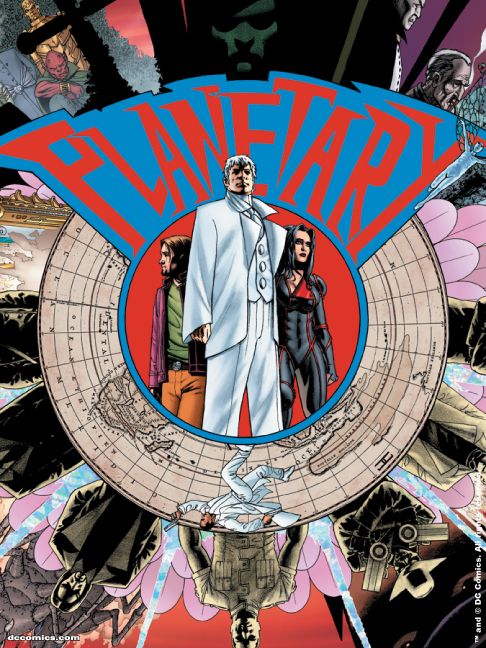Over a decade after it began, after numerous delays as a result of illness or competing projects, after three years since the penultimate issue, Warren Ellis, John Cassaday, and Laura Martin's "Planetary" concludes this week with issue #27. Considered by some to be one of the best comics of the past decade, "Planetary" has centered on an exploration of the 20th century, unearthing lost secrets, delving into a multitude of different genres, a pastiche of various corners of pop culture, coming together to make a statement about the superhero genre's dominance of comic books. Ambitious and quite wondrous at times, that the series ends is both a relief that the story is done and a sad moment since that means there is no more "Planetary" left.
After issue 26 ended the conflict between Elijah Snow, the 20th century's version of an anti-body and leader of the Planetary Organization, and the Four, a superpowered group dedicated to keeping humanity down and suppressing achievements that could make the world far better and more advanced, there is only one final piece of unfinished business, one looming loose end: Ambrose Chase, Planetary's 'Third Man.' Apparently shot and killed in issue nine, Elijah and his group, Jakita Wagner and the Drummer, have possibly found a way to save him.
The means by which they do this is both simple and exceedingly complicated as Ellis delivers page after page of theoretical physics regarding time travel, many of which you can read in the preview pages. Thankfully, Ellis often uses heavy science in his writing and is able to boil it down, at some point, to very workable, easy to understand terms. There's always a character who acts as the reader's window into the story and sums it all up. Getting past the actual explanation may be rough going, but it all becomes clear when put into action, including a callback to "Planetary/JLA: Terra Occulta." The scenes between Elijah and the team are exactly what readers have been missing: snappy banter with the odd thinly-veiled threat of violence and clashing passions. Elijah may be going off the deep end with his obsession to rescue Ambrose, so the Drummer and Jakita need to rein him in, if such a thing is possible.
Of course, the issue is absolutely gorgeous as John Cassaday makes a rare return to interior art, teaming again with Laura Martin, a team that works in complete harmony. The issue is packed with visual allusions to previous issues, both in the drawings and the colors. The return to the facility from issue nine is marked with a panel of red skies and dark blue ground, much like the colors in that issue. Cassaday draws lush, expansive technology, giving a sense of size and scope to Ambrose's rescue, infusing the characters with body language and expressions that communicates the severity and seriousness of the situation. The frustration that Jakita feels at not being useful, the passion Elijah shows when insisting on the rescue, the look of doubt in the Drummer's face... it's all evident on the page.
This final issue acts as an epilogue, part finale, part reunion show, one last piece of unfinished business, one last chance to see these characters interact, and for the fantastic team of Ellis, Cassaday, and Martin to collaborate. In some ways, it's superfluous, just an issue for the fans, but what's wrong with that? A story as big and sweeping as "Planetary" deserves one last send-off, 28 pages of story wrapped in the beautiful fold-out cover by Cassaday and Martin that manages to work in the entire series in its own way. I, for one, cannot wait to finally reread the entire series -- so if DC could hurry up with that second Absolute volume, I would appreciate it.

